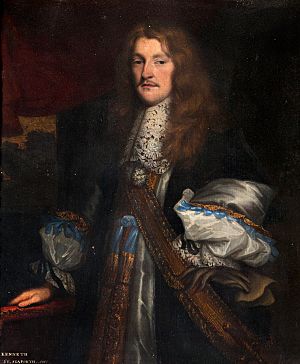Kenneth Mackenzie, 3rd Earl of Seaforth facts for kids
Quick facts for kids
Kenneth Mackenzie
|
|
|---|---|
| The Earl of Seaforth | |

Kenneth Mackenzie, 3rd Earl of Seaforth
|
|
| Chief of Clan Mackenzie | 1651–1678 |
| Predecessor | George Mackenzie |
| Successor | Kenneth Mackenzie |
| Born | 1635 Brahan Castle, Ross-shire, Kingdom of Scotland |
| Died | 1678 (aged 43) |
| Noble family | Clan Mackenzie |
| Spouse(s) | Isobel Mackenzie |
| Father | George Mackenzie |
| Mother | Barbara Forbes |
Kenneth Mackenzie, 3rd Earl of Seaforth (born 1635, died 1678) was an important Scottish leader. He was a clan chief and a Scottish nobleman from the Scottish Highlands. Kenneth was very loyal to King Charles II, even when the King faced many difficulties. Because he was very tall, people in the Highlands called him "Coinneach Mor," which means "Great Kenneth."
Contents
Early Life and Schooling
Kenneth Mackenzie was born at Brahan Castle in 1635. His father was George Mackenzie, 2nd Earl of Seaforth, and his mother was Barbara Forbes. The Mackenzie family was a powerful group from Ross-shire in Scotland. They became very important in the 1400s.
When Kenneth was about five or six years old, his father sent him to study. He went to a special school run by a minister named Farquhar Macrae. This school was at Eilean Donan Castle and was attended by sons of important families. Later, in 1651, Kenneth went to King's College, Aberdeen for more education.
Trying to Help the King
While Kenneth was at college, King Charles II was in Stirling. The King was trying to gather an army to invade England. Kenneth's father was away in Holland at the time. So, Kenneth decided to go home and try to raise his own clan members to fight for the King.
He went to Kintail with other important Mackenzie family members. However, the men of Kintail did not want to join him. They said he was too young and that they would only fight if his father, their true leader, was there. They believed the King could easily bring his father home if he needed him.
Loyalty to King Charles II
In 1651, King Charles II was defeated by Oliver Cromwell at the Battle of Worcester. After this loss, Charles had to escape to Europe. He lived in Flanders for many years, often facing hardship, until he could return to England in 1660.
Kenneth Mackenzie remained a strong supporter of King Charles II. He even joined the King's side at Stirling before the Battle of Worcester. After the King's defeat, Kenneth was taken prisoner. He stayed in prison for a long time.
In 1654, Oliver Cromwell's government took away Kenneth's lands and wealth. They did not even leave money for his wife and children. Despite these difficulties, Kenneth stayed loyal to the King. He was known for his strong spirit and noble character during his time in prison. People said that even though his lands were ruined, nothing could make him stop supporting his King.
Return to Power
When King Charles II was finally able to return to England in 1660, he remembered his loyal friend, Kenneth Seaforth. The King ordered Kenneth to be released from prison. After his release, Kenneth became a favorite at the King's court.
On April 23, 1662, Kenneth was given an important job. He became the Sheriff of Ross-shire. This job was later given to him and his eldest son together in 1675. After getting his affairs in order at Brahan, Kenneth visited Paris. He left his wife to manage their interests back home in Scotland.
Family Life
Around 1660, Kenneth married Isobel Mackenzie. She was the daughter of Sir John Mackenzie of Tarbat. Kenneth and Isobel had four sons and four daughters. Their eldest son, also named Kenneth Mackenzie, 4th Earl of Seaforth, became the next Earl when his father passed away in December 1678.
Line of Chiefs
| Preceded by Colin Mackenzie |
Chief of Clan Mackenzie 1651–1678 |
Succeeded by Kenneth Mackenzie |
| Peerage of Scotland | ||
|---|---|---|
| Preceded by George Mackenzie |
Earl of Seaforth 1651–1678 |
Succeeded by Kenneth Mackenzie |
 | Georgia Louise Harris Brown |
 | Julian Abele |
 | Norma Merrick Sklarek |
 | William Sidney Pittman |

